Status: 14.12.2021 1:43 PM
Pollack, cod, and salmon are among the most popular types of food fish. As their stocks in the North Sea are declining, the European Union has now set correspondingly lower fishing quotas. On the other hand, herring can be fished more.
New fishing quotas will be implemented in the North Sea from January. This also applies to German fishermen. In the future you will be able to increase your herring catch by 22 percent, but 25 percent less than this year’s herring catch. The share of cod fishing was slightly reduced by 2%. The allowable catch of fish has also decreased by ten percent. German fishermen’s catch of haddock, Arctic cod and Greenland black halibut will remain virtually unchanged next year. This decision was made at a meeting of EU Agriculture Ministers.
Agriculture Minister Ozdemir satisfied
The new federal agriculture minister, Cem Ozdemir of the Greens, was satisfied and spoke of a balanced compromise. As for North Sea cod, he was hoping for “a somewhat more ambitious approach,” he said. Environmentalists are also particularly critical of this stock. The World Wildlife Fund criticized “all signs of collapse”. More fish are still caught than scientists recommend.
The US Environmental Protection Agency Oceana has also criticized the fact that a third of the fishing limits that are now set are too high. Robert Howes, president of MSC, which issues a seal on sustainable fisheries, stresses the importance of proper stock management and criticizes the fact that many fish stocks are being fished more than researchers recommend. But there is an improvement: “In 2005, only 25 percent of European stocks were sustainably fished, today it is nearly 60 percent.”
Fishing quotas based on scientific recommendations
EU countries set the total allowable catch for some waters each year. On this basis, the national catches of each country are allocated by means of fixed distribution switches. The basis for the negotiations is a submission from the European Union Commission, which is based mainly on scientific recommendations. Many of the fish stocks are in rather poor condition.
In October, EU fisheries ministers approved fishing quotas in the Baltic Sea. Due to the continued poor condition of stocks, fishermen will not be allowed to catch herring and cod in large parts of the Baltic Sea next year, unless they are caught in nets as bycatch.
No deal with the UK yet
No agreement has yet been reached regarding the waters divided by the European Union and Great Britain. “Although we have done our best to conclude consultations on time, they are still ongoing with the UK on the 2022 catch quotas,” EU Environment Commissioner Virginius Sinkevicius said. Agreement must be reached “as soon as possible” with Great Britain.

“Award-winning music trailblazer. Gamer. Lifelong alcohol enthusiast. Thinker. Passionate analyst.”







More Stories
Property: Palace: Kate and William are affected by many news – Entertainment
King Charles has cancer – Harry returns to Great Britain
Great Britain: Celebrity Big Brother: Princess Kate's uncle expelled – Entertainment